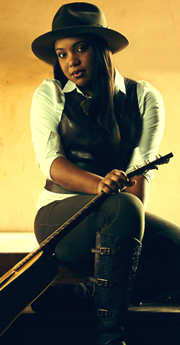Good songwriters intertwine addictive melodies and moving lyrics to create unforgettable records. Great songwriters can do this while also telling a life-changing story, as evidenced on Morgan Harper Nichols’ self-titled debut album.
Her powerful songs and upbeat outlook let the listener in on a day in the life of a songwriter with tremendous faith. The chorus of her lead single, “Storyteller,” says it all: You brought the pieces together, made me the storyteller / Now I know it is well. It is well / That’s the story I tell.
And the pieces are indeed coming together for Harper Nichols. A transplant from the Atlanta area, she has lived in Music City USA while working on her first album as an artist on Gotee Records. Her next destination is Texas, where she’ll be more centrally located for her ministry and be able to regularly indulge in one of her favorites, In-N-Out Burger.
“I love the west and Texas is one of the few places you can get In-N-Out and sweet tea at the same time,” she gushes. As excited as she is about her favorite burger joint, she’s even more excited about what God is doing in her life and music, because God, like a great songwriter, has been weaving her story — and it’s a good one.

As a girl growing up in Atlanta, she never envisioned a life on the stage. Morgan had her eye and heart set on the mission field. “Ever since I was four years old and I learned what missionaries do, that’s what I always said I wanted to be,” she recalls. Although her path hasn’t been the traditional route one might follow to become a missionary, she sees what she’s doing now as an extension of her original calling.
Harper Nichols believes the pursuit of her calling has culminated in the blending of her three passions: writing, singing and missions. “Between my sister [Gotee artist Jamie Grace] and I, we feel that our music is a tool to inspire people and to encourage them to not go through life aimlessly. There’s more. There’s hope. There’s Jesus. So, it’s very natural for me to adapt this as ministry and missions. I feel like my music embodies those things,” she says.
She has had to adapt to being in front of an audience, something that doesn’t come naturally to her. A voracious reader and self-professed hoarder of novels, she kept to herself as a child, expressing her creativity by writing stories. At the age of fourteen, Harper Nichols’ mother gave her a home school assignment to set her stories to music, and songwriting was a natural progression.
She titled that assignment song “Drowning.” It was about people overwhelmed by their circumstances. Penned shortly after Hurricane Katrina, her mom felt like the message needed to be heard, so her daughter began singing it at refugee centers for victims of the storm. It was then that young Harper Nichols began to see glimpses of how a music and missions mash-up would play out.
Although she knew then that God was calling her to encourage people with her music, she faced a journey of her own in being able to embrace her God-given voice. She became aware of the depth of her voice at a young age when she had to sing with the boys in choir. “At eight years old that was humiliating. I didn’t want to be in the boys section,” she says. Later, when Morgan was in college, a comment from a classmate pushed her closer to the edge of doubt. She recounts the conversation soberly, “This guy freshmen year asked me, ‘Why do you sing like that? It doesn’t sound good.’” In college at sixteen years old and already singled out because of her young age, his comments stuck with the impressionable teenager.
Those seeds of doubt almost seeped into Harper Nichols’ debut project. As she began the recording process with producer Paul Mabury, she was timid with her vocal performance. She couldn’t keep her insecurities veiled behind the studio microphone, and Mabury saw an opportunity to constructively criticize. “I leaned into the microphone, started to sing, and then he stopped the music and said, ‘That’s not how you sing. You’re singing like you feel like you’re supposed to be singing. Don’t do that. Sing the way you sing.’”
She eventually told him about the harsh words spoken by her college classmate. He lovingly but firmly addressed the situation; “You just need to sing how you’re supposed to be singing. I’m going to hit record and leave the room and you’re just going to sing it out the way it’s supposed to sound.” The producer’s words were the catalyst she needed to sing freely. “From that moment forward I didn’t hold back. I poured out what God had given to me,” she says. She felt God used Mabury’s words in that moment to speak healing into her heart. She now fully embraces the gift of a unique voice.
The lesson of her struggle to accept God’s gift isn’t lost on Harper Nichols. Because of her experience, she is passionate about encouraging young girls and all teens alike to love themselves regardless of how they look or sound. “You can say some stuff that really destroys a kid—it can really cause a lot of damage. Jamie [Grace] and I take every opportunity we can to send a message to girls that they’re important regardless of their eye color, hair texture, how tall or short they may be…” she explains. Her debut project is packed with songs that drive these messages home for the listener.
So far, it appears fans are embracing her message and her voice. With the success of her “Storyteller” video, also featuring her sister, and overwhelmingly positive reviews of her album, the stage is set for Morgan Harper Nichols to make an impact both through her stories and her song.


Leave a Reply
You must be logged in to post a comment.